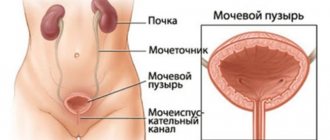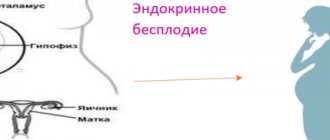Lactation
During breastfeeding, serum prolactin levels are more than 23 ng/ml. The hormone content is maintained at a high level throughout the entire period of lactation and is independently normalized after stopping breastfeeding.
Biological functions of prolactin:
- decreased sensitivity to pain in the birth canal or after cesarean section;
- protection from unwanted pregnancy during breastfeeding;
- regulation of milk production in the volume necessary to fully saturate the newborn;
- participation in the production of calcium;
- restoration of the menstrual cycle;
- acceleration of regeneration of blood vessels of the birth canal.
During lactation, a woman may develop a tumor process in the brain, which is associated with increased activity of the pituitary gland and hypothalamus. Symptoms of the pathology are not always pronounced. By associating increasing levels of prolactin concentration with ongoing breastfeeding, a woman’s neoplasm is detected late.
How to reduce high prolactin levels in women and men?
If you do not yet know the exact cause of high prolactin, then we first recommend reading the article “Elevated prolactin in women: causes and consequences,” because further treatment tactics depend on the cause. An increase in the hormone causes, first of all, impaired reproductive function.
It is with this problem that patients turn to their gynecologists, and from there they are sent to an endocrinologist, where this pathology is discovered.
Therefore, the goal of treating hyperprolactinemia is to restore menstrual function in women and sperm quality in men, which is possible only after normalization of the hormone level.
Regardless of the reasons that caused increased prolactin, treatment is inevitable, unless it is the surprising phenomenon of macroprolactinemia , which we wrote about in a separate article. Because if this is not done, then over time serious complications may arise, for example, blindness caused by the growth of a pituitary adenoma.
Today there are three methods of combating pathology:
- drug treatment for elevated prolactin
- surgical method
- radiation treatment method
to contents
A brain tumor
The pituitary gland, one of the parts of the brain, is responsible for the production of prolactin in the female body. If disturbances occur in its structure, the concentration of the hormone increases. An imbalance is observed during the development of both benign and malignant neoplasms. Symptoms of a tumor process in the pituitary gland:
- Dizziness, inability to stay in transport due to motion sickness.
- Frequently recurring headache. In the presence of a malignant tumor, the syndrome is difficult to eliminate with standard analgesics.
- Increased intracranial (not general arterial) pressure.
- Nausea, vomiting.
- Impaired consciousness, fainting.
- Nosebleeds.
Additional symptoms depend on the nature of the tumor, its size, the age of the patient, and the presence of concomitant pathologies.
Treatment of hyperprolactinemia
Treatment of such a disease occurs only after a detailed study of the causes that caused it and the existing symptoms. If the increase in hormone is caused by a tumor of the pituitary gland, then both drug and surgical treatment are possible.
There is a group of drugs that are, in their pharmacological basis, dopamine agonists or dopaminomimetics. Dopamine is a neurohormone that regulates prolactin in the body. For this reason, your doctor may prescribe the following dopamine-containing drugs:
- bromocriptine;
- cabergoline;
- pergolide;
- quinagolide;
- norprolac;
- dostinex.
All of these drugs eliminate the symptoms and consequences of increased prolactin in a woman: milk production stops, the menstrual cycle normalizes, and tumor size decreases.
You need to take the medicine for a long time, since a lasting therapeutic effect is achieved only after two months of treatment. These medications are considered equally effective, but when planning pregnancy, doctors prefer bromocriptine, which has the least toxicity.
If there is no result of conservative treatment and the tumor continues to grow, the patient is prescribed surgery. Modern medical technologies make it possible to remove pituitary tumors through the nasal sinuses without injuring the skull.
Stress
Psycho-emotional shock is closely related to the development of hormonal imbalance, as it contributes to a whole chain of changes in the body. Due to the impact of a stressful event, one of the parts of the brain - the pituitary gland - intensively produces adrenocorticotropic hormone (ACTH). This substance acts on the adrenal cortex, which produces cortisol. The steroid hormone promotes increased synthesis of prolactin, so to reduce its concentration you only need to avoid stress.
Thyroid diseases
In the case of the development of pathologies such as hypothyroidism, autoimmune thyroiditis or thyroid cancer, an imbalance of biologically active substances occurs in the body. With these diseases, there is a decrease in the production of iodine-containing hormones. The concentration of prolactin in the blood increases due to the fact that the amount of triiodothyronine and thyroxine is not enough to maintain its balance.
Other signs of thyroid dysfunction:
- intense hair loss;
- problems with swallowing due to the sensation of a foreign body in the throat;
- pallor, increased dryness of the skin;
- lack of appetite;
- trembling of hands and feet;
- dizziness;
- increased fatigue;
- decrease in the body's protective abilities.
To normalize prolactin levels, a woman should undergo a course of hormone replacement therapy aimed at compensating for thyroxine and triiodothyronine.
Intimacy
During sexual intercourse, hyperprolactinemia can reach high levels due to the woman's arousal. An increase in hormone levels is associated with increasing levels of oxytocin during intimacy. Like prolactin, it is produced by the hypothalamic-pituitary system. After sexual intercourse, hyperprolactinemia disappears on its own within 2-3 hours. In order to obtain correct blood test results, on the eve of undergoing a test to determine this hormone, a woman is not recommended to have intimate intimacy.
Reducing prolactin with folk remedies
Currently, herbal medicine for high concentrations of the hormone prolactin has not been fully studied and is not accepted by official medicine. However, there are many recipes on the Internet using various herbs.
We would like to caution that you should use herbs with caution during pregnancy because many of them can cause miscarriage or have teratogenic effects.
Also, herbs will be useless against high levels of the hormone prolactin caused by pituitary adenoma. Agree that herbal medicine for an oncological process, even a benign one, sounds, to put it mildly, stupid and unconvincing.
Until you eliminate the true cause of the increase in hormones, no herbs will help. But there are cases in medicine when the cause is not found, such an increase is called idiopathic. In this case, you can try folk remedies to get rid of the problem.
Herbs that reduce prolactin:
- common twig
- hop cones
- passionflower
- hawthorn fruit
- Melissa
- peony root
- Adonis
- sage
to contents
Is it possible to restore prolactin with herbs?
Before deciding on such treatment, find a person who is well versed in this. Don't put your health at even greater risk.
to contents
How to reduce prolactin without drugs?
In the vast majority of cases, it is impossible to restore prolactin levels without the use of medications.
to contents
Pituitary stalk transection syndrome
It is an interruption of the connection between the hypothalamus and the adenohypophysis resulting from a benign or malignant neoplasm. The consequence of the pathology is the cessation of the flow of dopamine into the portal system and the release of large amounts of prolactin. Signs of pituitary stalk transection syndrome:
- Dizziness.
- Increased intracranial pressure.
- Fainting.
- Nausea, vomiting.
- Headache that is difficult to relieve with analgesics (often manifests itself as a migraine).
- Visual impairment, sensation of sand getting into the eyes.
- Increased fatigue.
In severe clinical cases – inability to be in an upright position.
Due to the anatomical features of the hypothalamus and adenohypophysis, removal of the tumor is not always possible. Therefore, the tumor is treated with hormonal drugs, and the patient is given symptomatic treatment.
Polycystic ovary syndrome (PCOS)
A pathological condition in which multiple cysts form inside the ovaries. In half of the cases, a woman learns about the presence of pathology only during an examination for infertility. The reasons for the development of PCOS are heredity, unstable sex life, previous operations on the ovaries or injuries to this paired organ.
Signs of the condition:
- Increased hair growth on the face and body (male type).
- Weakening libido.
- Menstrual irregularities.
- Increased oily skin, acne on the face and body.
- Neurological disorders.
Hyperprolactinemia indicates destabilization of ovarian activity. To confirm the presence of an imbalance, the patient undergoes an ultrasound and laboratory blood tests. With polycystic disease, the ovaries produce an increased amount of estrogen, which enhances the synthesis of prolactin.
The main reasons for increased prolactin
There are several types of hyperprolactinemia:
1. Physiological. These include an increase in prolactin production in a healthy body:
- Pregnancy (prolactin levels increase significantly by the 8th week of pregnancy).
- Lactation period.
- Intense physical activity.
- High protein diet.
- Deep sleep phase.
- Emotional stress.
- Sexual intercourse.
2. Pathological (deviations from the norm). This condition can occur with the following diseases:
- Tumor of the pituitary gland or hypothalamus.
- Damage to the pituitary stalk during surgical procedures.
- Compression of the pituitary gland with the development of the “empty sella” syndrome.
- Conducting radioactive therapy.
- Thoracic injuries, including breast surgery.
- Endocrine disorders: polycystic ovary syndrome, Cushing's syndrome, hypothyroidism.
- Hypovitaminosis B6.
- Anorexia. This mental illness leads to a person’s refusal to eat, severe weight loss and phobia of weight gain.
- Taking medications, including hormonal contraceptives, antihypertensive drugs, narcotics.
- Development of renal and liver failure.
- Obesity. Associated with the accumulation of estradiol in fat cells, which provokes the production of prolactin.
Symptoms
Hyperprolactinemia manifests itself with a wide range of symptoms, including:
- Inability to bear a child. In 95% of cases, miscarriage occurs in the 1st trimester of pregnancy.
- The appearance of discharge from the nipples. The condition is not associated with breastfeeding and is defined as galactorrhea.
- Weakening libido.
- Increased fatigue, fluctuations in psycho-emotional state, tendency to develop depression.
- Increase in body weight (by at least 10% of the woman’s weight before the period of hyperprolactinemia). The causes of the condition are a slowdown in metabolism and attacks of uncontrolled appetite.
- Intensive hair growth on the skin of the face and body.
- Tendency to damage bones.
- Weakened memory, impaired concentration.
- Menstrual irregularities. Menstruation becomes irregular and painful, and there is a long delay.
- The appearance of acne on the skin of the face and body.
- Discomfort in the chest, feeling of lack of air.
Additional manifestations of hyperprolactinemia are an increase in the volume of the mammary glands, increased sensitivity of the areolas and nipples.
Is it worth treating high prolactin with radiation?
This method is not used in women planning pregnancy. With the radiation method of treating high prolactin, the effect of the procedure develops slowly, approximately 12-18 months are needed to evaluate the effectiveness of the treatment.
The outcome is 100% hypopituitarism, and possible damage to the optic nerves. Therefore, treatment of hyperprolactinemia with radiation is carried out in exceptional cases:
- As an additional effect after surgery in patients when a large volume of tumor remains.
- In case of ineffectiveness and intolerance of drug therapy.
- In patients for whom surgery is contraindicated or who refuse surgery.
to contents
Consequences
An increased level of prolactin in the blood and the underlying condition that caused this imbalance, in the absence of competent, timely treatment, lead to the development of the following complications:
- Obesity. Caused by metabolic disorders and constant bouts of hunger.
- Frigidity. A condition in which a woman cannot become aroused, which over time causes complete indifference to sexual activity.
- Infertility. Inability to conceive a child after 1 year of sexual activity without using contraception. After normalization of prolactin levels, the woman’s reproductive status is restored.
- Atrophic changes in the mammary glands caused by hormonal imbalance.
- Ovarian cancer. A malignant tumor is formed due to critically high levels of prolactin. If left untreated, it leads to death.
- Insulin-dependent diabetes mellitus.
- Coronary heart disease, as a consequence of metabolic processes in the body.
- Hypoplasia of the uterus. Refers to precancerous conditions.
- Vegetative-vascular dystonia caused by hormonal changes.
- Malignant breast tumor. The tumor occurs as a result of hormonal imbalance and may remain undetected for a long time.
The listed pathologies negatively affect the state of the nervous system. Therefore, against the background of hyperprolactinemia, neuroses and panic attacks often occur, which in both cases requires contacting a neurologist and undergoing appropriate treatment.
How to lower prolactin with drugs to get pregnant?
Conservative treatment is the main method. Even if surgery is required to remove a pituitary adenoma - prolactinoma - pills to lower prolactin are first prescribed to slightly reduce the size of the tumor. This is necessary to make it easier for surgeons to perform the operation.
to contents
When are prolactin-lowering drugs prescribed?
- As a primary treatment for individuals with prolactin-producing tumors.
- For rapid correction of the neurological consequences of large tumors.
- To reduce the size of tumors before surgery.
- In pregnant women with rapidly growing tumors during pregnancy.
- As an additional remedy for mixed tumors.
- For idiopathic hyperprolactinemia .
- For infertility and galactorrhea (discharge of colostrum from the nipples) caused by increased prolactin.
to contents
What pills are there to lower prolactin?
Below you will see the main groups of drugs that are used to treat this disease. These drugs are also called prolactin secretion inhibitors or prolactin blockers.
- Ergoline (preparations of ergot alkaloids).
- Non-ergoline (norprolac).
Ergoline drugs, in turn, can be divided into two groups:
- short-acting (bromocriptine, parlodel, bromergon, abergin);
- extended action (cabergoline (Dostinex), parlodel LAR (for intramuscular injection)).
We will talk about the dosage regimen and features of each drug in other articles.
to contents
Is it possible to take medications during pregnancy without harm to the body?
The use of bromocriptine and dostinex does not have a negative effect on the development of the fetus, even if the drug is taken throughout pregnancy.
Also, clinical studies have not proven the relationship between taking drugs and the development of miscarriages, miscarriages and early spontaneous abortions. But the following tactics are currently adopted:
- In case of microadenoma, treatment is interrupted and re-administered after childbirth, while the child will be bottle-fed.
- In case of macroadenoma, it is not recommended to interrupt treatment.
to contents









